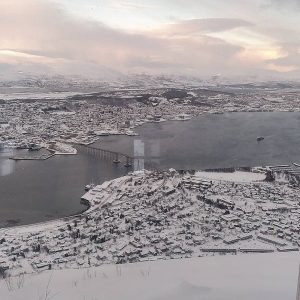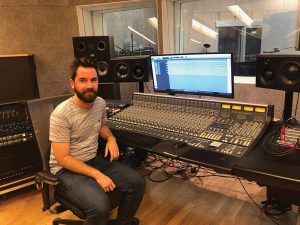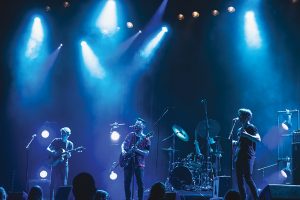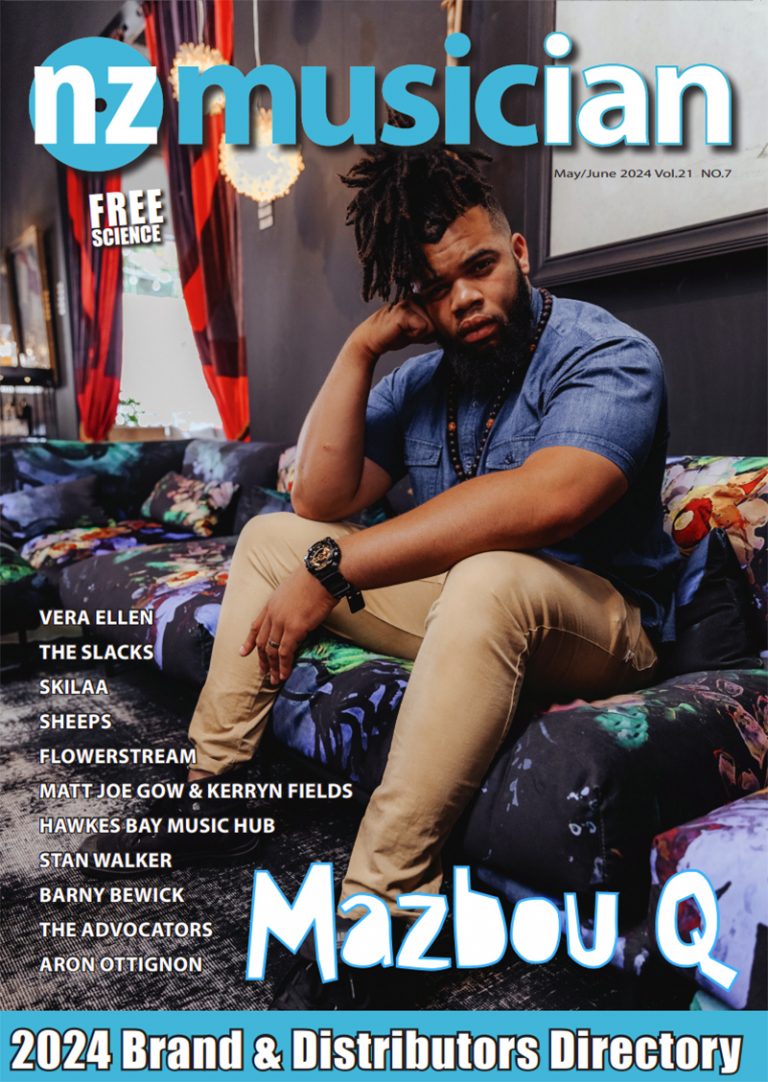Ex-Pat Files: Ellery Daines
Ex-Pat Files: Ellery Daines
Multi-instrumentalist, rock songwriter, and musician Ellery Daines left Auckland in 2018 to follow his then-girlfriend (now-wife) to Tromsø, Norway. Though finding it difficult to start from scratch in a small arctic town, he discovered that Norway respects rock music as a professional career and a genuinely valuable part of local culture. Over the last five years he’s established himself as a producer and engineer, alongside releasing his debut album, ’Failure Thirty Minutes Deep’, in April 2022.
In 2016-2017 I was living in Auckland with my then-girlfriend (now-wife), working for an electricity company and desperately shoehorning in every bit of music I could on the side. I had two EPs’ worth of self-penned rock songs, and I performed them roughly once a month with my band at small venues around Auckland.
It was tough. Shows were generally attended by band members, close friends and partners, and pretty much no-one else. There were frequent noise complaints, including one at a university orientation concert in the middle of the afternoon, on my birthday. An art gallery, of all things, complained and got the concert shut down an hour or so before we were due to play.
In April 2017 an American metal band played a show at the now-demolished Kings Arms, which was forcibly shut down by 14 police officers after a noise complaint from an irate resident nearby. It was before midnight on a Saturday. Shortly after that incident, my drummer’s cymbals were stolen from his car, in a Wilson’s carpark with security cameras. He saw the thief get into a van and drive away, informed the police, and described the van to them. Police did not catch the culprit.
These two incidents were completely unconnected, of course, but it was interesting to see the stark contrast in how seriously the police took a case against musicians, compared to a case where a musician needed their help. To me, that was a pretty accurate reflection of the general attitude towards local music culture from the community at large.
Also in April 2017, my girlfriend moved to Norway to do a post-doctoral research fellowship. She asked me to come with her, and after a year of indecision I made the move in March 2018. It was a tough call to leave behind my band, friends and musical network. Despite the bad experiences, the people I actually worked with in the music community were unfailingly amazing, kind and helpful. I played one final show with my band in December 2017, then left for Tromsø, a town of about 80,000 people in the Norwegian arctic.
 It’s a strange thing to consider yourself “a musician” or “an artist” for such a long time, and then suddenly be faced with the prospect that you’re not one anymore. I had no idea what the music scene was like in Tromsø, but I knew I would be starting from scratch with no friends or network, and the added complication of a language barrier. I also had no idea what I was going to do for a living – worst case just get a supermarket job or something, and then move back to NZ after my girlfriend’s work contract finished – hopefully not getting too out of practice on the guitar and maybe writing some songs in the meantime.
It’s a strange thing to consider yourself “a musician” or “an artist” for such a long time, and then suddenly be faced with the prospect that you’re not one anymore. I had no idea what the music scene was like in Tromsø, but I knew I would be starting from scratch with no friends or network, and the added complication of a language barrier. I also had no idea what I was going to do for a living – worst case just get a supermarket job or something, and then move back to NZ after my girlfriend’s work contract finished – hopefully not getting too out of practice on the guitar and maybe writing some songs in the meantime.
Some fun facts about Tromsø: Being in the arctic, you get about two months of darkness in winter when the sun doesn’t come up, and then two months of 24-hour daylight in summer. You can buy whale steak at the supermarket. (No I haven’t tried it; I’m vegetarian anyway.)
The cost of living is astronomical – a weekly grocery shop is easily 2-3 times the price it would be in NZ, a small pint of terrible house beer is $15-20 at the pub, and any service costs an arm and a leg. The flipside of this is wages are high, inequality is low, the average standard of living is fantastic, and a good work-life balance is near-sacred.
Despite being reasonably small, Tromsø is still the largest city in northern Norway – you have to drive about 20 hours south before you find somewhere bigger. This makes it a de facto cultural hub, and means it has way more musical activity than it has any right to for its size. There are multiple music and film festivals each year, and pretty much always something exciting happening in the city. Original music is also prized here – I literally don’t think I’ve seen a single covers band in the four years I’ve been here so far. The average ticket price to see a local band is NZ$25-35, and people happily pay it.
After I arrived, I took a stab and emailed the head of a local recording studio called Kysten Studio. I explained who I was, sent him some recordings that I had mixed, and asked if I could work at the studio as an engineer. I had plenty of experience recording my own music at home but none in a professional studio. My previous attempt to get studio work in Ōtautahi had resulted in the one studio that actually responded giving me a list of previous customers to cold-call and offer a special deal, and that was it.

Miraculously, the response this time was “Yes! Great! Let’s meet up and chat.” I got informally apprenticed to a recording engineer, assisted him on a few studio sessions, then graduated to running my own. I offered a handful of free sessions to start while I was learning the ropes, and things pretty quickly took off from there.
Tromsø is small enough that word-of-mouth gets you a long way. One of the bands I recorded for free ended up hiring me to produce their next two full-length albums. Now, in addition to working at Kysten Studio, I have my own smaller studio where I mix music, practice with my band, and record people who don’t have the budget or the technical requirements to book Kysten.
Throughout my time in Tromsø I continued writing, recording and mixing my album ’Failure Thirty Minutes Deep’, a project I started in NZ. It is largely focused around my frustrations with being a musician in NZ and my subsequent decision to leave. As with previous EPs, I recorded all the parts myself instead of getting a band together. This was partly because I’m used to working that way, but also because it was a slow process breaking into the social scene here to find musical friends I could count on. Norwegians are generally much more insular and slow to make new friends than Kiwis are. And even though they all speak fantastic English, Norwegian is still the go-to language, especially for casual banter.
The spectre of Covid-19 obviously hung over this time period too. I was lucky in that I had pretty steady work throughout, even as the live music sector imploded. A lot of artists recorded music while they couldn’t tour, so studio bookings actually went up.
Norway didn’t close its borders or push for elimination the same way NZ did, so we didn’t have the same all-or-nothing lockdowns over here. That might seem enviable to some, until I point out that up until January this year, we had maybe 14 days without any restrictions. That’s in total, since the start of the pandemic. There were a lot of rock concerts to seated audiences at reduced-capacity venues, size limits on private gatherings with friends, and last-minute plan changes as restrictions were suddenly added or removed with little forewarning. As with everywhere else, cultural events were the first to be shut down and the last to reopen again.
 Now my album is finished, it’s coming out April 29, and I have an awesome band to play it live. (Including a fellow Kiwi from Motueka who I’d never met before moving to Norway, despite him being the cousin of one of my best high-school friends. Small world!) I’m currently in the process of booking my first-ever tour; a small regional tour around Northern Norway. I’ve been lucky enough to get some funding for both the album and the tour from local organisations.
Now my album is finished, it’s coming out April 29, and I have an awesome band to play it live. (Including a fellow Kiwi from Motueka who I’d never met before moving to Norway, despite him being the cousin of one of my best high-school friends. Small world!) I’m currently in the process of booking my first-ever tour; a small regional tour around Northern Norway. I’ve been lucky enough to get some funding for both the album and the tour from local organisations.
All in all it’s been a mixed bag, especially with the massive curveball of Covid, as you would expect. I’ve also glossed over how ruthlessly difficult Norway is to live in when you’re starting out. Nevertheless, I think my move to Norway illustrates the importance of opportunity in shaping people’s success. I work hard, sure, but I’m no more hard-working now than I was in NZ.
In Auckland I was working an office job I had no long-term interest in and music was a side hobby I barely had time for. In Tromsø I went from no professional experience, to producing music for a living, while having enough time to devote serious energy to my own project, in the space of four years. All because I am now in an environment that respects music as both a professional career and a genuinely valuable part of local culture, instead of treating it like some kind of annoying hobby that people should be encouraged to grow out of.
Maybe I’m being a bit too harsh on NZ, and I hope I get proven wrong. I’m sure people who play genres other than rock have an entirely different experience, for a start.
I also haven’t been back since Covid, and maybe something has changed. Maybe the local scene was kickstarted again while international acts were shut out. If that’s the case, I hope Kiwis still appreciate what they have once Covid restrictions end and borders are permanently open again. Otherwise, passionate, talented, hardworking artists and music producers will leave and keep leaving.

